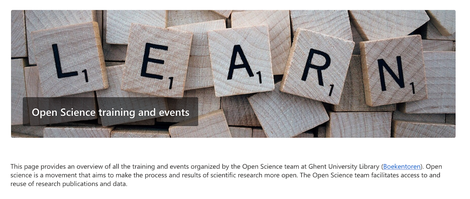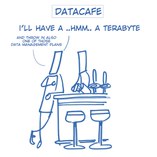Training and events
Want to learn more about RDM? Follow a training, request an info session, or attend an event organized by Ghent University’s data stewards and curators.
- Take a look at upcoming training & events for practical details of planned sessions.
- Our training materials are available via https://osf.io/57gvr. Also check out our growing collection of RDM and open science knowledge clips!
- Want to request a training? Any other questions? Contact us!
Overview
We deliver different types and formats of training activities and events.
RDM transferable skills course
This in-depth course aims to help doctoral students develop their knowledge of and practical skills in managing their research data. It is organized in collaboration with the Doctoral Schools, as part of Ghent University’s Doctoral Training Programme (transferable skills in the cluster Research & Valorisation).
The course focuses on various kinds of data – quantitative and qualitative, depending on what is most relevant in each Doctoral School – and covers the whole data lifecycle. It combines presentations, exercises and discussions to cover best practices as well as practical examples.
The course is organized in each of the 5 Doctoral Schools and is normally offered two times a year (once in the spring and once in the autumn).
RDM online modules
- A short introductory module on RDM, as part of the section on 'Good Research Practices' in the mandatory onboarding track for doctoral students in Ufora
- Ufora course 'Fundamentals of Research Data Management (RDM)', a self-paced, online course which takes you through all the different aspects of Research Data Management.
RDM short sessions
These are single-topic info sessions covering one specific aspect of RDM or an RDM-related tool (typically no more than 60 minutes, including time for discussion). Ty are aimed at researchers at all career stages, and comprise both more theory-based and more practically oriented sessions.
RDM short sessions can be organized as part of existing initiatives within Faculties (e.g. Faculty library lunch sessions), and are also available on demand (e.g. for departments or research groups).
Example info session topics:
- RDM: general introduction
-
Policy requirements for data management & sharing
- Preparing a DMP
- Reusing data from others
- Collecting & organizing data
- Documenting data
- Storing & backing up data
- Sharing & publishing data
Example demo & practical session topics:
- Encryption of research data
- Open Science Framework
- Publishing data via a data repository
- GitHub
DataCafé
An informal, cross-faculty and researcher-led event where Ghent University researchers from various domains have an opportunity to give a short but inspiring talk about their research data, and how they manage them.
The dataCafé aims to bring together researchers with an interest in and/or useful experience of (a specific aspect of) RDM, and provide opportunities to network and exchange experiences and best practices across faculties and research domains over drinks and food.
Other
In addition to the recurring formats listed above, we may (co-)organize other training activities and events about specific themes on a more ad hoc basis (e.g. a workshop on reproducibility and open research, etc.).
Upcoming training & events
Check our overview page for details on upcoming training and events, such as RDM transferrable skills courses, short sessions, and the dataCafé.

External online learning resources
Need more inspiration? Many external learning resources about RDM, open & FAIR data are available online. Some are generic, others are tailored to particular disciplines.
General
- 23 Research Data Things: self-directed learning for anyone who wants to know more about research data. Covers a range of concepts and includes exercises. Offered by the Australian National Data Service.
- Data Protection and Ethics: introduction to research ethics and data protection (what is personal data, and how to protect them during your research?). Offered by FOSTER Open Science.
- FAIR webinar series: each of the FAIR principles is explained in depth, with practical cases from several scientific disciplines. Offered by the Australian National Data Service.
- Guides for Researchers: online guides on various aspects of RDM, open & FAIR data. Offered by OpenAIRE.
- Managing and sharing research data: the basics of data sharing, FAIR data and DMPs. Offered by FOSTER Open Science.
- Research Data Management and Sharing: a basic introduction to RDM covering the following blocks: 1) Understanding Research Data; 2) Data Management Planning; 3) Working with data; 4) Sharing data. Offered by the University of North Carolina at Chapel Hill and the University of Edinburgh.
- Research Data Management Toolkit: toolkit signposting RDM resources, sorted by topic and audience. Offered by Jisc.
- The Turing Way: a handbook on reproducible data science. Offered by the Alan Turing Institute.
- Understanding the GDPR: basic concepts about GDPR and how to comply with the regulation. Offered by the University of Groningen.
- What is Open Science?: the importance of Open Science, what are funders’ expectations, and how to make your research more open. Offered by FOSTER Open Science.
Environmental sciences
- Data Management Training (DMT) Clearinghouse: a registry for online RDM learning resources focusing on Earth and Environmental Sciences. Created in a collaboration between the U.S. Geological Survey's Community for Data Integration, the Earth Sciences Information Partnership (ESIP), and DataONE (Data Observation Network for Earth).
- Data Tree: training course on data management, with a focus on environmental sciences. Offered by the Institute for Environmental Analytics and Stats4DS.
Humanities
- Manage, Improve and Open Up your Research and Data: course on data management, with a focus on the Humanities. Offered by Parthenos.
- Preserving your Research Data: lesson on how to document and structure research data to ensure they remain useful in the future, with a focus on historians. Offered by The Programming Historian.
- Data management resources: RDM-related learning resources available via the DARIAH-CAMPUS platform.
Life sciences & medicine
- RDM Guide: data management resource for biologists and life scientists, curated by ELIXIR Belgium
- Data management knowledge, tools, and training: compilation of tools, guidelines and other training resources, with a focus on Life Sciences. Prepared by the Dutch Techcentre for Life Sciences.
- Handbook for Adequate Natural Data Stewardship: data management handbook for researchers at university medical centres. Offered by Health-RI (NL).
- TeSS: training portal of ELIXIR (Europe's distributed infrastructure for life-science data), which also contains materials on RDM.
Social sciences
- Data Management Expert Guide: data management course with a focus on social sciences, to help researchers make their data FAIR. Offered by CESSDA ERIC.
